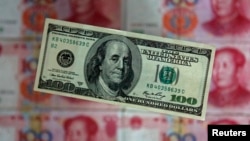BEIJING —
A Chinese ratings agency cut its credit rating for U.S. sovereign debt by one notch to A-minus from A on Thursday, saying a deal struck by Congress to raise the government's borrowing ceiling failed to solve the cause of its debt problem.
Dagong Global Credit Rating said that the temporary fix of the debt issue would not defuse the fundamental conundrum of the U.S. fiscal deficit or improve repayment ability in the long-term, but could trigger defaults at any time in the future.
“The deal means only an escape from a debt default for the time being, but hasn't changed the fact that the growth of government borrowing has largely outpaced overall economic growth and fiscal revenues,” China's biggest home-grown ratings agency said in a statement.
The U.S. Congress on Wednesday approved an 11th-hour deal to end a partial government shutdown and pull the world's biggest economy back from the brink of a historic debt default that could have threatened financial calamity.
Dagong said the increase in the debt ceiling, for the fifth time since President Obama took office in 2009, provided further proof of the U.S. government's inability to make improvements to fiscal fundamentals that were needed to enhance its debt servicing capability.
It said it held a negative outlook for the United States, noting that the Federal Reserve continued to inject dollars into the market through quantitative easing policies, eroding the value of the outstanding debt and hurting creditors' interests.
The downgrade put the United States several notches below Dagong's top rating and on par with Brazil, Israel and Panama, among others.
Dagong's ratings are barely watched outside of China, and major international credit agencies classify most countries very differently from the Chinese agency.
Dagong estimated that the U.S.'s foreign creditors could have suffered an estimated loss of $628.5 billion between 2008 and 2012 due to a weakening of the U.S. dollar.
China, sitting on the largest stockpile of foreign exchange reserves in the world, is the biggest holder of U.S. treasuries.
Dagong's views do not necessarily represent the Chinese government's stance, however, its analysis often runs in tandem with remarks from government officials.
China's Vice Finance Minister Zhu Guangyao had earlier urged the U.S. government to take “concrete steps” to resolve the fiscal cliff issue and meet its responsibility to uphold stability of international financial markets.
A commentary on the official Xinhua news agency on Thursday took the two main U.S. political parties to task for “brinkmanship”.
“The saga in Washington is teaching America's creditors a lesson: U.S. politicians are ready to fight each other at the expense of debt-holders' interests and U.S. Treasury bonds may no longer be safe investment,” the commentary said.
The commentary does not reflect official policy but is an insight into views held at the top levels.
Fitch Ratings said on Tuesday it had placed a negative outlook over its AAA rating for the United States due to the political brinkmanship. Moody's Investors Service rates the United States at Aaa, while Standard & Poor's rates it at AA-plus.
Dagong Global Credit Rating said that the temporary fix of the debt issue would not defuse the fundamental conundrum of the U.S. fiscal deficit or improve repayment ability in the long-term, but could trigger defaults at any time in the future.
“The deal means only an escape from a debt default for the time being, but hasn't changed the fact that the growth of government borrowing has largely outpaced overall economic growth and fiscal revenues,” China's biggest home-grown ratings agency said in a statement.
The U.S. Congress on Wednesday approved an 11th-hour deal to end a partial government shutdown and pull the world's biggest economy back from the brink of a historic debt default that could have threatened financial calamity.
Dagong said the increase in the debt ceiling, for the fifth time since President Obama took office in 2009, provided further proof of the U.S. government's inability to make improvements to fiscal fundamentals that were needed to enhance its debt servicing capability.
It said it held a negative outlook for the United States, noting that the Federal Reserve continued to inject dollars into the market through quantitative easing policies, eroding the value of the outstanding debt and hurting creditors' interests.
The downgrade put the United States several notches below Dagong's top rating and on par with Brazil, Israel and Panama, among others.
Dagong's ratings are barely watched outside of China, and major international credit agencies classify most countries very differently from the Chinese agency.
Dagong estimated that the U.S.'s foreign creditors could have suffered an estimated loss of $628.5 billion between 2008 and 2012 due to a weakening of the U.S. dollar.
China, sitting on the largest stockpile of foreign exchange reserves in the world, is the biggest holder of U.S. treasuries.
Dagong's views do not necessarily represent the Chinese government's stance, however, its analysis often runs in tandem with remarks from government officials.
China's Vice Finance Minister Zhu Guangyao had earlier urged the U.S. government to take “concrete steps” to resolve the fiscal cliff issue and meet its responsibility to uphold stability of international financial markets.
A commentary on the official Xinhua news agency on Thursday took the two main U.S. political parties to task for “brinkmanship”.
“The saga in Washington is teaching America's creditors a lesson: U.S. politicians are ready to fight each other at the expense of debt-holders' interests and U.S. Treasury bonds may no longer be safe investment,” the commentary said.
The commentary does not reflect official policy but is an insight into views held at the top levels.
Fitch Ratings said on Tuesday it had placed a negative outlook over its AAA rating for the United States due to the political brinkmanship. Moody's Investors Service rates the United States at Aaa, while Standard & Poor's rates it at AA-plus.





